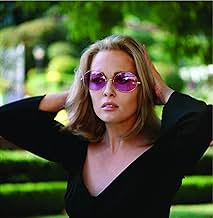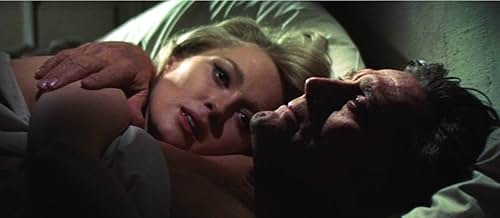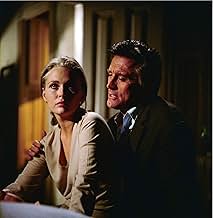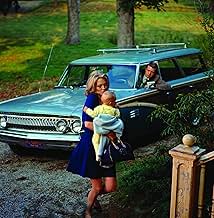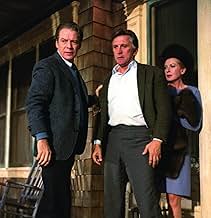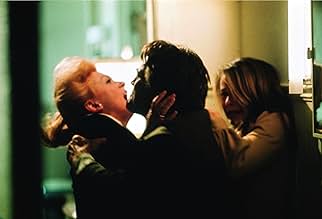CALIFICACIÓN DE IMDb
6.3/10
3.5 k
TU CALIFICACIÓN
Un publicista intenta reconstruir su vida destrozada después de sufrir una crisis nerviosa.Un publicista intenta reconstruir su vida destrozada después de sufrir una crisis nerviosa.Un publicista intenta reconstruir su vida destrozada después de sufrir una crisis nerviosa.
- Premios
- 1 premio ganado y 3 nominaciones en total
Carol Eve Rossen
- Gloria Anderson
- (as Carol Rossen)
E.J. André
- Uncle Joe
- (as E.J. Andre)
Donna Anderson
- Girl in Motel
- (sin créditos)
Brian Andrews
- Child
- (sin créditos)
Opiniones destacadas
Not classic Kazan, for sure, but not a total failure either. Was lucky enough to see the film in Paris a few years ago on the big screen. Was struck by Kazan's attempt to break free from the well made play structure he'd so successfully mined in the past. The linear story, though, won out, making the film uneven and stylistically self conscience. But even so, what a marvelous failure. Kirk Douglas, in Kazan's opinion may not have filled Brando's shoes, but, my god, he tried. Dramatically speaking, the film is exploring a state of mind; the character played my Douglas remains, for the most part, in a very static position throughout. Douglas never allows the stain of self pity to disfigure his action. Sitting still, thinking, we see in Douglas a man pulsating with anger, remorse, and the need to act. It's a valiant and satisfying performance even though, like the film itself, we're more aware of what it's reaching for than what it actually holds. The performance, though, that really struck me as being brave and bold is the one given by Deborah Kerr. She's the wife, and she has a lengthy scene late in the film where she and Douglas stray into the intimate area of their married life. Sexually frank and mature, the scene alone is worth the entire film. These two characters discuss intimacy, and then act on it, in a way I've never seen in a film. Kerr was one of the most adventurous actresses of her day; a truly great talent. She gives Kazan the raw, unguarded kind of performance one usually associates with Liv Ullman in her Bergman films.
Deborah Kerr reportedly stopped doing movies after 1969 (even though she took film roles much later in life) because she no longer felt comfortable with the direction that the movie industry was going. After seeing "The Arrangement", I no longer question her sensitivity to the turbulent themes, language, and cinematography that was coming of age in the late 60's. On the surface, the film epitomizes many of the psychedelic themes of the era, from rampant flash-backs to cartoonized exclamations, such as "Bam!" and "Kerbloom!" splashing across the screen in bright neon colors. Beneath this, however, is the intensely challenging story of a man who wakes up one morning to discover that he detests the person that he has become. Kirk Douglas's Eddie Anderson will send chills up your spine as you watch him evolve from a successful advertising executive with the perfect house, the perfect job, and the perfect arrangement of both a wife and several mistresses, into a tormented, weakened man who despises himself enough to attempt suicide but believes in life enough not to carry through completely. His metamorphosis belies the chaotic style of the film; even though the erratic cinematography attempts to reflect his inner turmoil, the sense of peace that settles onto his face as the film progresses reveals that the reality of Eddie's mind is less insane than the reality of the world outside. He begins to see beyond the pretentions and fears that engulf the world around him and that had once turned him into a heartless executive,willing to convince consumers that cigarettes are good for them rather than lose a multi-million dollar client. Everyone around him, with the exception of Faye Dunaway, worships the "almighty dollar," and Eddie's release from this self-made prison allows him to make peace with himself, even as he makes enemies all around himself. Faye Dunaway is stunning and provocative as the insolent "office slut" who restores Eddie's faith in himself, ironically, by pointing out his flaws. In fact, she delivers what is possibly the most believable performance in the entire film, because her character, the strong, opinionated woman who accepts no sympathy for her decisions and weaknesses, has survived this tumultuous period much better than the character of say, the 60's housewife who desires nothing more than a maid, a swimming pool, and a wealthy husband. Deborah Kerr fills the role of Eddie's uncomprehending wife to perfection, even though anyone who has seen her in more flattering roles, as in her performance as Karen Holmes in "From Here to Eternity", won't be able to watch her portrayal of Florence Anderson without crying inwardly for the lost beauty of her earlier roles. Kerr is certainly ravishing in this film, despite the fruity-peach lipstick and the fluffy-headed hairstyle inflicted on her by the makeup department, but the uncertainty and bitterness that she plays to perfection in "The Arrangement" contrast sharply with the delicate mixture of sincerity and self-confidence that she exhibits in most of her early work. If you have not yet seen this film, make sure to read the book first. Elia Kazan's unique and personal style will illuminate the his meaning much more than any stylized cinematography could hope to. After reading the book, however, make sure to see the film, if only to admire the fine performances of the actors and to identify with the characters on a more immediate level. And, of course, just to watch the ever beautiful Deborah Kerr work her magic...
Panned and patronized at the time of it's initial release, Elia Kazan's adaptation of his best selling book THE ARRANGEMENT plays much better now than it did in 1969. Made after a 6 year hiatus from film-making at a time when movies were enjoying unheard of freedom due to the demise of the production code, THE ARRANGEMENT clearly shows that Kazan was still a director to be reckoned with. The basic premise was nothing new. A highly successful businessman (Kirk Douglas) suffers a mid-life crisis and attempts suicide. How he and the other characters deal with the aftermath make up the rest of the story. Kazan has always been an actor's director and the film provides a showcase for the young Faye Dunaway as Douglas' mistress who gets him to reexamine his life but wants out to be with someone else. Deborah Kerr in her last major film appearance is superb in the difficult role of the wife who tries to understand what Douglas is going through but doesn't want to give up the rich lifestyle she's become accustomed to. Strong support is given by Hume Cronyn as the family solicitor who has plans of his own and from Richard Boone in a rare non-Western role as Douglas' ailing father. His slide into dementia is both heartbreaking and terrifying. Marlon Brando had originally agreed to play the lead but bowed out allowing Kirk Douglas who really wanted to work with Kazan to step in. While not stage trained like the other principals, he acquits himself well in an emotionally as opposed to a physically demanding role. The combination of raw emotions, alternating points-of-view including black humor, and touches of surrealism was ambitious then and still is today (think American BEAUTY). The movie is not without its flaws. It runs too long and is occasionally sloppy in everything from editing to make-up but the powerful writing and intense performances make THE ARRANGEMENT provocative film-making nearly 40 years later. Called everything from a harrowing emotional ride to a self-indulgent mess, it is ultimately for the home viewer to decide (my rating indicates where I stand). Kazan will always be a controversial figure because of his HUAC testimony in the 1950's but his greatness as a director cannot be denied and remains captured on film for all to see.
Old-fashioned melodrama longing to be flashy and modern. Director Elia Kazan, adapting his own bestseller, has assembled a terrific cast in story of a 44-year-old married advertising executive with a mistress who attempts suicide. Cold and detached, the film wants us to sympathize with a lot of people we might normally recoil from: the rich and privileged who live in a well-heeled vacuum. As Kirk Douglas' other woman, Faye Dunaway, who was featured in a slew of pictures from 1967-1969, was perilously at risk of being overexposed. She's gorgeously coiffed and manicured here, but her impassive face and personality don't involve the audience--and all of Douglas' striding up and down over her seems like a wasting disease. Kazan wants us to see the unsavory nature of these people, the office sharks and their suffering wives at the mercy of their whims, but the bitter 'truth' behind his portrait is heightened--just as it was in pictures like "Peyton Place"--and after a while it all begins to seem like a rancid put-on. ** from ****
Some pretty big names, right at, near, or just past their peaks... kazan, douglas, dunaway, kerr, cronyn. Ed anderson is an ad man. (the irony of the "clean" cigarette campaign.) he has a midlife crisis. And of course, we flash back to what brought him to this point. Everyone wants to know what really caused it... the doctors, the therapists, coworkers, his wife. At the center of all this is gwen, the office "assistant", who doesn't have any clear duties. And now eddie wants to take care of his father, who has dementia. It's a psychological-thinker film. Izzokay. Moves pretty slowly. And gets pretty heavy. Lots of yelling. It's all well done, but i can understand why people thought it was such a downer. And so long. Keep an eye out for harold gould.. he was "miles" on golden girls. Written and directed by elia kazan. According to the trivia section, this kind of became his swan song.
¿Sabías que…?
- TriviaCritics were overwhelmingly negative when the film came out, and it was the consensus that Elia Kazan should never have filmed his own best-selling novel, which was panned by most literary critics as trash when it was published in 1967. It was widely known that the lead role had been turned down by Marlon Brando, who had garnered three Academy Award nominations and was awarded one Oscar under Kazan's direction at the beginning of his film career and was the heart and soul of some of Kazan's best work as a movie director. By the late 1960s, after a string of flops, most critics felt Brando was through as a movie star and that he desperately needed Kazan to turn his career around, both as an artist and as a box-office star. When the film came out, Kirk Douglas' lead performance was roundly panned, and most critics felt that even Brando at his best couldn't save what was, in essence, a melodramatic potboiler. The failure of "The Arrangement" was the end of Kazan's own career as an A-list director.
- ErroresWhen Eddie's father eats the piece of white bread, the number of bites and placement of the bread on the tray or his belly changes between shots.
- Créditos curiososExcept for the title, company logo and "A Film Written and Directed by Elia Kazan," all the remaining credits are at the end, which was still uncommon in those days.
- ConexionesEdited into Un Américain nommé Kazan (2018)
Selecciones populares
Inicia sesión para calificar y agrega a la lista de videos para obtener recomendaciones personalizadas
- How long is The Arrangement?Con tecnología de Alexa
Detalles
- Fecha de lanzamiento
- País de origen
- Sitios oficiales
- Idioma
- También se conoce como
- The Arrangement
- Locaciones de filmación
- Productora
- Ver más créditos de la compañía en IMDbPro
Taquilla
- Total a nivel mundial
- USD 9,536
Contribuir a esta página
Sugiere una edición o agrega el contenido que falta

Principales brechas de datos
By what name was El arreglo (1969) officially released in India in English?
Responda

